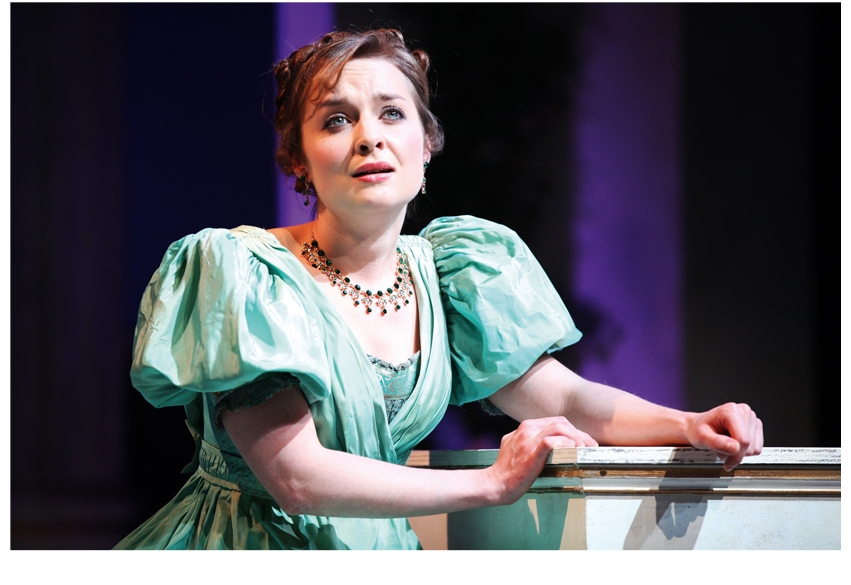Dante didn’t have the foresight to create or depict a circle of the Inferno designed expressly for opera critics, with intrepid explorers of new operas with social agendas as an extra. That was left for almost seven centuries until the Royal Opera House came up with the idea of the Linbury Studio Theatre, which answers the most stringent requirements for such a place of torment. You go down, down again and then down, sit in acute and always freshly experienced discomfort, and try to concentrate on yet another exploration of inequality, multiculturalism, a variety of shocking discriminations. Isn’t there a box to be ticked for letting a perfervidly right-wing budding musical dramatist air his or her views in multimedia form, leaving the audience rigid with fury and resentment, instead of the usual weary agreement that there are lots of things wrong with our society and it is the job of productions at the Linbury to make us want, or nod that we want, to put them right?
The latest addition to the Linbury canon is YES, text by Bonnie Greer and music by Errollyn Wallen. It concerns the notorious episode of Question Time in which Nick Griffin appeared, and was made to feel as uneasy as possible by the other panellists and especially by David Dimbleby, the chairman. Bonnie Greer was invited to appear, and, after soul-searching, she agreed. This docu-opera ends with the announcement of the start of the programme, so what we get is not, alas, Dimbleby taken by a resounding bass baritone, but the librettist sitting at her desk and watching, reflecting in the weeks leading up to the broadcast.
There is a large screen on to which the names of many tribes, groups of people who have lived in or invaded or otherwise arrived in the UK down the millennia, are projected, demonstrating that we have always been a mixed society. The singers and actors run around, sing, mostly unintelligibly, represent various points of view, but there is no narrative, no discussion, so it sounds as if it is open-minded, but of course it isn’t.
As usual with these Linbury ventures, the music is eclectic and unmemorable, and so far as one can judge extremely well performed. The only thought-provoking remark is a quotation, voiced by Greer, from John Stuart Mill about the permissible limits of free speech. And that, of course, is the issue: how tolerant can and should we be of intolerance? Greer gets no nearer to answering that than our politicians, but at least it is their job to work on it, while I am not at all clear that this kind of quasi-artistic enterprise could ever make a compelling contribution to that debate. YES makes no contribution to anything.
At the Royal Academy of Music there were four performances of Berlioz’s rather rarely performed Béatrice et Bénédict, the first three conducted by Sir Colin Davis, surely the greatest champion that Berlioz has ever had. The production was simple and helpful, as it usually is when John Copley is in charge, and the standard of singing and acting at least as high as we’ve come to expect; and the orchestra, in this still tricky music, extremely secure.
I saw the first cast. Its members mainly coped well with the often awkward transitions from arias and ensembles to Shakespeare’s lines, spoken — the dialogue in English, the sung parts in French, an intelligent procedure. I do find Much Ado About Nothing one of Shakespeare’s most irritating comedies, though it’s easy to see why Berlioz found it so appealing. Berlioz raided it in the way that any sensible operatic composer would, except that he wasn’t any more sensible in that capacity than in any other. It’s an extraordinarily fidgety work with no sense of relative balances — there are immensely prolonged settings of minor episodes, and almost inadvertent treatment of crucial ones.
The piece that everyone must adore is the Nocturne that ends Act I, near-relative of the love music in Les Troyens — but that is sung by a subsidiary character and her companion. Nathalie Chalkley and Sarah Shorter were so exquisite that one almost wished things stopped there. In Act II there are never more than a few minutes where one isn’t aware that Berlioz is a rare genius, and only a few more minutes before one is brought up by another ineptitude. The Béatrice of Katie Bray was stunningly brilliant — I hope this is one of the operas which the RAM has recorded and will release; and the Bénédict of Samuel Furness, with far fewer opportunities, made just as strong an impression.
Thanks to Sir Colin, this was a sold-out short run, but any opera at the RAM is well worth seeing.






Comments